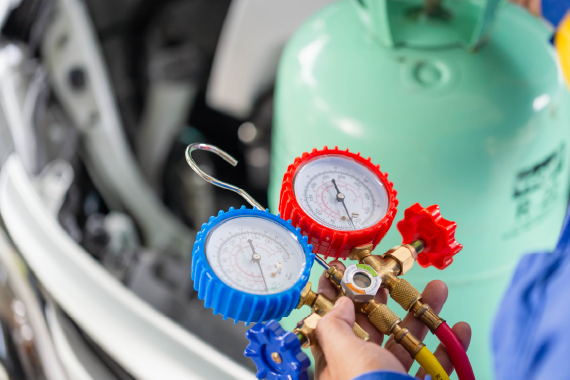We collaborate to achieve sustainable success
Get in touch with usThe Fight Against Illegal F-Gas Trade: Strengthening Supply Chain Due Diligence for Importers
The European Union's ambitious F-Gas Regulation (EU) 2024/573 aims for a definitive phase-out of hydrofluorocarbons (HFCs) by 2050, driven by aggressive reduction schedules and new production caps. While designed to accelerate the transition to climate-friendly alternatives, this scarcity of legitimate HFCs in the EU market, coupled with high prices, has unfortunately fueled a sophisticated illegal black market. For importers of pre-charged equipment, this escalating illicit trade poses a significant threat, not only to environmental goals but also to business integrity, demanding a critical focus on strengthening supply chain due diligence to avoid severe legal, financial, and reputational repercussions.
The urgency to combat illegal F-gas trade is underscored by its multifaceted negative impacts. Beyond undermining the EU's climate objectives, this illicit activity is often linked to tax evasion and organized crime, further complicating the legitimate market and increasing compliance risks for honest businesses. The scarcity created by the legitimate quota system makes compliant HFCs more expensive, creating a powerful incentive for unscrupulous actors to import cheaper, illicit alternatives.
The Modus Operandi of Illegal Trade and Enhanced Enforcement
Illegal F-gas trade often involves sophisticated smuggling networks, frequently sourcing from countries like Türkiye and China and routing products through various EU entry points, such as Bulgaria. Common indicators of illicit trade include suspicious offers or the use of non-refillable cylinders, which are banned in Europe due to their high environmental risk.
The EU has significantly enhanced its enforcement mechanisms to combat this threat:
- Digitalized Customs Controls: Designated customs offices are prioritized for connection to the F-Gas Portal, allowing for real-time verification of quotas and importer status during customs clearance. This robust digital audit trail makes it exceptionally difficult to falsify documentation or bypass quota requirements, flagging discrepancies for further scrutiny.
- Cross-Border Cooperation: Increased collaboration between customs, environmental agencies, and market surveillance bodies is mandated, including intelligence sharing with bodies like the European Anti-Fraud Office (OLAF). OLAF tip-offs have already resulted in significant seizures of illegal F-gases; for instance, Dutch authorities, acting on OLAF's information, confiscated nearly 4,800 cylinders of F-gases at the port of Rotterdam, valued at approximately €1.5 million. Another joint customs operation led by OLAF intercepted the equivalent of over 400,000 tonnes of CO2, preventing market loss of over €4.5 million. Italian customs also intercepted over 40 tonnes of illegal HFC refrigerant, with non-refillable cylinders subjected to criminal seizure.
- Enhanced Traceability and Cylinder Rules: The regulation mandates enhanced traceability labelling, creating a "digital fingerprint" for F-gas containers and equipment. Combined with stricter rules on F-gas containers (e.g., prohibitions on non-refillable cylinders), this empowers enforcement agencies to verify compliance and product legitimacy more effectively. Non-compliant cylinders face confiscation.
- Severe Penalties: Non-compliance carries substantial financial fines, potentially exceeding €1 million, and can lead to customs delays, seizure of goods, market exclusion, and even criminal charges, including imprisonment for serious environmental offenses. A new EU directive on environmental crime, published in April 2024, allows polluters to be charged under criminal law, with maximum imprisonment terms of not less than 10 years for serious crimes causing death or substantial environmental damage. Breaches related to manufacturing, importing, exporting, or releasing fluorinated greenhouse gases are explicitly covered as criminal offenses.
Strategic Due Diligence for Importers
Given the escalating risks, strengthening supply chain due diligence is a strategic imperative for importers:
- Rigorous Supplier Vetting: Importers must rigorously vet all suppliers, demanding comprehensive documentation that proves the legitimacy and compliance of all imported products. This includes verifying GWP values, origin, and adherence to EU quota requirements.
- Verification of Quota Coverage: Ensure that the HFCs within pre-charged equipment are fully accounted for under a valid quota prior to customs clearance. Demand clear declarations of conformity.
- Awareness of Red Flags: Be wary of suspicious offers, unusually low prices, or the use of non-refillable cylinders. These are common indicators of illicit trade.
- Transparent Documentation: Maintain meticulous records of all F-gas related activities, including import volumes, GWP calculations, and quota authorizations. These records are critical for annual reporting and mandatory third-party verification.
- Leveraging the F-Gas Portal: Utilize the F-Gas Portal for mandatory registration, tracking quota allocations, and submitting accurate reports. Its interconnection with customs is a powerful tool for enforcement, demanding exceptional accuracy and timeliness in business record-keeping.
- Partnering with Experts: Collaborating with specialists can provide invaluable assistance in navigating the complexities of the F-Gas Regulation. Such partners can help ensure accurate reporting and verification, strengthen supply chain due diligence, and facilitate the strategic transition to low-GWP refrigerants, safeguarding against the significant risks of non-compliance.
Engaging, even unknowingly, with illicit supply chains can severely compromise an importer's integrity, leading to a loss of trust from legitimate partners, distributors, and customers. By proactively strengthening supply chain due diligence, importers can not only mitigate severe penalties but also protect their reputation and ensure their long-term viability in the EU's increasingly climate-conscious market.

